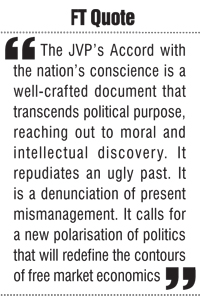Sunday Feb 15, 2026
Sunday Feb 15, 2026
Saturday, 25 July 2015 00:00 - - {{hitsCtrl.values.hits}}
 The political document unveiled by the JVP is a spirited attempt to infuse a moral and intellectual urgency for the dismantling of ‘politics as usual’ and ‘patronage politics’ practiced for the past 67 years
The political document unveiled by the JVP is a spirited attempt to infuse a moral and intellectual urgency for the dismantling of ‘politics as usual’ and ‘patronage politics’ practiced for the past 67 years
The third force has ended the age of complacency that has lasted for 67 post-independence years. In the process, the JVP has promised the country something that we never realised as missing. The party that chose to abdicate armed rebellion in carefully-crafted eloquence has now conceptualised what has been absent in the politics of patronage practiced since independence – a liberated citizenry.
The front cover depicts a wooden ladle of rice on a background of a pleasing shade of red. The red is soothingly subdued and holds out the promise of a new dawn. The title reads ‘An accord of Conscience’ – the national programme’.
A legend below explains that the conscience is that of the ‘Janatha Vimukthi Peramuna’ implying that their ‘conscience’ and that of our land is more or less the same. This writer is inclined to agree.

Anura Kumara Dissanayake speaking at the manifesto launch
A spirited attempt
The political document unveiled by the JVP is a spirited attempt to infuse a moral and intellectual urgency for the dismantling of ‘politics as usual’ and ‘patronage politics’ practiced for the past 67 years. The Sinhala prose is precise and piercing.
The present structure and substance of governance under the two party system is geared to serve a society driven by excessive consumerism and a relentless pursuit of profit. It calls for change in the structure and system of governance.
The immediate task is to install a foundational government that will restructure the state and build an enlightened society that holds out the twin promises of economic resilience and social justice.
The document has five principal components viz. A people centric government, Human resource excellence, building a modern industrialised land, an equitable society and a liberated citizenry.
Stirring indictment of the political class
The introduction is a stirring indictment of the political class.
“After 67 years of alternate governance by UNP and SLSP led coalitions that promised development, prosperity and renewal, we finds ourselves in a pitiful plight, with our people in terrible torment and senseless suffering.”
Systemic neglect and wilful destruction of productive avenues have reduced our land to a State of perpetual dependency on internal and external borrowing. 
The deception of exaggerated claims of development are beginning to be exposed. Deliberate distortion of wealth distribution has intensified the pain of poverty. While 20% of families claim 55% of the domestic product, the poorest 20% families can only access 3.6 % of the gross domestic product.
Sri Lanka confronts a grave financial crisis. The absence of a clear economic policy and the failure to allocate adequate financial provisions has paralysed vital sectors of education, transport and housing.
In Sri Lanka, 360,000 children are annually enrolled in schools while only 30,000 leave universities and other tertiary educational facilities. What this sorry statistic reveals is that nearly 330,000 of those who are enrolled in schools each year leave without completing studies.
While the annual number seeking employment exceeds 300,000, the state and the formal private sector can cater only to 65000. The balance 235,000 enter the ranks of the deprived and unemployed resulting a class of people devoid of hope and dignity. Erosion of social and cultural cohesion is its inevitable consequence.
Police statistics indicate a rape every three hours. There are more than 100,000 drug addicts, with one drug addict for each group of fifty families. 14 persons commit suicide per day. This sums up the sum total of achievements of the two party democracy of 67 years.
People are constantly subject to pressure from national and religious extremism. National unity is yet to be achieved.
Bribery and corruption has become pervasive with oppression and abuse of power threatening the democratic fabric. When taken in its harrowing entirety, it is clear that Sri Lanka is now in the grip of a social, economic, political and cultural crisis.
Transcending political purpose
 The JVP’s Accord with the nation’s conscience is a well-crafted document that transcends political purpose, reaching out to moral and intellectual discovery. It repudiates an ugly past. It is a denunciation of present mismanagement. It calls for a new polarisation of politics that will redefine the contours of free market economics.
The JVP’s Accord with the nation’s conscience is a well-crafted document that transcends political purpose, reaching out to moral and intellectual discovery. It repudiates an ugly past. It is a denunciation of present mismanagement. It calls for a new polarisation of politics that will redefine the contours of free market economics.
That the new JVP is ready and willing to take on the challenge of redefining the contours of the market economy was made evident by JVP’s representative Sunil Handunnetti when participating in a panel discussion with Dr. Harsha De Silva of the UNP and Bandula Gunwardene of the SLFP initiated by the Ceylon Chamber of Commerce last Tuesday telecast on Rupavahini. It was fascinating to watch the UNP and JVP competing to give a human face to market economics.
The JVP, said Sunil Handunneti, is not afraid of globalisation. He conceded that globalisation and its impact offered many challenges. The problem according to him was not the pace of globalisation but our failure to claim a decent and adequate share of global trade that is growing by leaps and bounds.
Goods and services he said were bought and sold among countries several times more than the volume just three decades earlier. Yet our share of global trade has dwindled to near negligible levels. It was riveting to watch the JVP informing the Brahmins of commerce that they understood the systems of international capital and its struggle to support wider flows and the quandaries it faced. The JVP it seems is ready to read the weather of international trade and grapple with the storms it may produce.